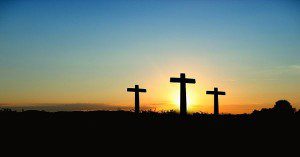There you are, bound tightly up in your various garments. Your cloak, your tunic, your hat. It’s been an awfully long and frustrating day. It started off fine, you got up, you had breakfast, you got dressed in all these robes that are now constricting you, and you went to work. But just when you were getting into your groove, word came down from management that you had to drop everything you were doing, and trot down to the center square and bow down to the big golden statue recently erected for purposes of inclusion, community building, and worship.
There, throngs are already gathered together. Hundreds of government officials have had to drop everything, like you, to make an irritating journey to signal their loyalty and support to the dear leader. Everyone is hot and tired. But when the band strikes up and the reverberations rumble up under everyone’s feet and stir all the feelings so necessary to keep everyone trucking down the highway of survival and life, in one grand sweep, the whole crowd bows to the ground and the music lofts up and makes it look amazing.
But there you stand. You just can’t do it. You can’t bow. It’s too ridiculous and terrible and the massive, golden statue, ninety feet high and nine feet wide, does not impress you.
You cast your mind back, painfully, to the pile of rubble that used to be a true place of worship. It wasn’t Liberace covered in gold like this idol. It had a big courtyard. You climbed up hundreds of steps and landed in a smooth open place looking toward the hidden, the secret tabernacle. One day there was worth all the others elsewhere. Especially here.
The music keeps playing and you just stand there. That’s how it played out. And now you are here looking at an immense, fantastically hot furnace, heated to seven times its usual hotness. That’s the number of completeness. It is perfectly hot. Which means, when you go in, that you’re going to die. Actions have consequences. If you don’t bow to the statue, you die in the fire. That’s how it works.
That’s how it worked in that primordial moment when Eve stared wide-eyed at the serpent and decided to just go with it. Eat the fruit, he said, so she did. And so did Adam. It wasn’t just, at that moment, disobedience. Standing up when you were told to bow down, but treachery.
Treachery because Adam and Eve were supposed to live in the presence of God, in holiness and purity and comfort and joy, caring for his sanctuary, his garden, having dominion over the creation he had given them. But instead of doing that, they followed after God’s great enemy, obeying a mere creature rather than God. And so they were thrown out of that serene and perfect place, where life was meant to go on forever, and sent into the harsh tomb-like wilds of life, but really, as we know it now, death.
If actions didn’t have consequences, if one thing didn’t follow familiarly and logically upon another, there would be no way to orient yourself in your life. It is the most basic and most important thing a parent tries to teach a child. Don’t touch the stove, you’ll get burned. Don’t put your finger in that socket. Don’t toddle into the road. Don’t ride your bike without a helmet. Don’t eat too much sugar. Be friendly and then people will be friendly to you. Work hard and you can get good grades. Get to work early and your boss will be happy. If you do this, then this will happen. It’s how we live. It’s how the universe is ordered.
But at the deepest point of the human psyche is the idea, the hope, the deep longing that maybe actions don’t really have consequences. Or really, if we were going to be honest, the hope that whatever God said would happen, wouldn’t happen. That he is not the one bringing the consequence about, that you yourself are the one who can make something new and better and happier. That’s why there’s a big fat golden idol standing in the middle of the square, why Eve and Adam ate that bright alluring fruit, why I think that a few extra turns around the internet will not have any effect on my mind, or mulling over the cruelty of another person will not produce a deep rooted bitterness.
The crowds on Friday, baying for blood, did not look so tidy as this crowd that bows so decorously and neatly every time the music plays. It wasn’t at all clear, on Friday, which action would have which consequences. Pilate, despairing of understanding the truth, the Truth staring him down so steadily, actually washes his hands. It’s not my problem, he says. No matter what happens, don’t blame me.
It’s so confusing, so hard to know what to do, so impossible to see into the future. The dual crumbling unsteady pillars of trust in the logical order of one thing following upon another, and the deep knowledge that you yourself are good, and no matter what you do it will probably be fine, bring us each down to the grave one by one, the only sure thing in the universe.
So there you are. Into the fire you go. The heat, the flames. The men who throw you in are practically consumed. They die. And, you, are you dead?
In some sense you are. You died long ago when you managed to look at the Truth and see that the only sure and certain force that brings about anything is him, that whatever he says always comes to pass, that whatever he does always succeeds. When you looked at him you did die, but not in the dismal and drab way of boxes and coffins and dirt. You died to some inner torturous portion of yourself–the treacherous part, the part that bites the apple, that builds the idol, that washes the hands of responsibility, that blames God, that insists on, above all things, the self. That part of you died.
You wouldn’t lie and say it wasn’t painful. It was, because, in some sense, that part of you was all of you. The totality of yourself was against the Truth. And so the death stung, a little. But not much.
No more than finding yourself walking around alive in a perfectly hot fire, which, if you have the Holy Spirit lighting you up, is how you get through every day. And when you look up, trying to orient yourself to your new toasty surroundings, there in the fire with you is the one you so longed to see, who you least expected in this place of fear and tribulation.
No more than lugging a lot of spices up a hill as the pink rays of the morning sun are just beginning to crest the horizon. You plunk them down and peer into the gray light of the early dawn. Actions have consequences. And one consequence of being beaten and nailed to a cross is that you’re dead. Really dead. All the way dead.
But the ground of all being had said that, having been planted, as a seed in the ground, on the third day the one who was completely dead would rise up again, alive in the flesh, the first fruits of all those who had died, and are dying, and will die, having said it, it would come to pass.
The most ancient consequence, the one that we didn’t believe, didn’t know, didn’t understand, being that if a perfect God joined himself to humanity in the flesh, and in all of his perfection took the place of the traitor, the sinner, the idolator, the coward, the confused, the cast down, the afflicted, that that trade would break apart the cosmic order and rearrange it. The smooth, serene sanctuary of the Lord would overtake the human heart. That the thing we know best, death, would be undone and destroyed.
Now it doesn’t really matter what your clothes are doing to you, or if the crowds are shouting or bowing or full of evil. It doesn’t matter how long the day is, or how hard. It doesn’t matter if you are comfortable or uncomfortable. Too hot or too cold. All of these are passing away, fading, rotting, smoldering, ruining. What matters now is that the unchangeable Word of God, the Truth, brought death itself to heel. That he is making all things new. That he is risen.












